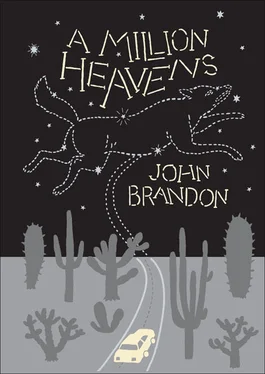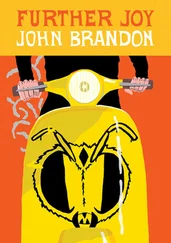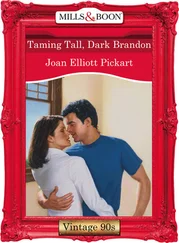In Fresno, Arn found work at an outfit that produced diploma frames. The place was full of lesbians, and a lot of them prided themselves on having been fired from other jobs because of their lifestyles. Arn’s task was to cut the backboards of the frames down to size. He had his own area and could set it up as he chose. When he cut a board too small or large, no one bitched. They threw it out and tried another. Arn cut boards and cut boards and ate the free food the company was always ordering for lunch.
He met a woman in Fresno, a bartender. This woman let Arn help out at her bar on weekend nights, extra money for Arn. Each night, after the bar closed, the people who worked there held a low-grade party at someone’s apartment. They would drink a little and do some drugs and eventually pair off and go home. At one of these parties, Arn drank a bunch and went out into the yard and looked into the sky and it struck him for the first time that he might be a murderer. He’d never let himself consider this possibility — hadn’t been ready to, he guessed. He’d hit the man with a blunt metal object and the man might very well not have survived. The man had not recovered. They’d rushed him to the hospital and tried everything to save him, but it had been too late. The mother and son were alone now, more miserable than before. The mother and son hated Arn. Arn’s case wasn’t getting buried by fresher offenses. It was still right at the top. A murderer. Arn’s face was probably on posters back in Washington. He was on a special page of the national fugitive database reserved for real scumbags, his face among the faces of rapists and such.
In Nevada, Arn spent his days standing on a platform, ears plugged and knees rattling, feeding strips of scrap plastic into a grater.
In Phoenix, at a mine supply, he stood inside a huge warehouse and instead of cleaning and organizing the place, as he was being paid to, he threw a golf ball back and forth with a bald man who ate a lot of snack cakes and did calisthenics. No one ever checked on the two of them. Arn realized his attitude toward work had changed. He used to want to impress people, to impress himself, and now he only wanted to reach the end of another day and another week and get his check. He was an adult, for better or worse. He took naps on piles of tire tubes. Sometimes he swept. The building was so long that when Arn threw the golf ball it would bounce three or four times before it reached the bald man.
Arn’s second day in Tucson, he went into a coffee shop to look at want ads and struck up a conversation with an Asian lady. The lady was much older than Arn, but you could only tell that by her eyes. He asked her to meet him for a movie later and she readily agreed. Arn was glad he’d bothered to put on a decent shirt. The lady left the coffee shop and Arn switched to a different section of the newspaper, the one with the movie times. There was a theater right downtown, about two blocks from where Arn was sitting, and this was good because he didn’t want this woman to know that he didn’t have a car. That was a revelation that could wait.
The Asian lady met Arn for the movie and later in the week for dinner and another day they went for a long walk in a park. The Asian lady did not seem intent on enjoying these dates, was not stymied with the question of whether she and Arn were connecting. She was going on the dates, it seemed, because she knew it was healthy to go on dates and foolish to turn them down. When Arn had been acquainted with her for two weeks he asked her if he could stay with her until he found his own place and she agreed to this.
The Asian lady had plum streaks in her hair and she ate a lot of bagels and did a lot of sit-ups. She had no family in this country. She had graduated from business school at University of Arizona and had applied for a loan to open a sunglasses shop and the loan had been approved. She was about to open a second shop. She didn’t say much to Arn, but when she touched him she did so gently, like he was precious. She never said a word about his lack of an automobile. She said nothing about the trouble he was having finding a job. She didn’t understand the jokes Arn made, seemed to have no use for them.
One morning, instead of bagels, she whipped up a breakfast of eggs and bacon and toast. When Arn sat down to it, she asked him if he would like to marry her.
Arn set his orange juice down.
“Is this a citizenship issue?” he asked.
“This is a I’m getting old issue. You like me. I’m good-looking.”
It occurred to Arn that you could ask someone to marry you right away, like the Asian lady was doing, or else you had to wait a long time and pick the right moment and be sure of everything. They seemed equally good methods.
“We get married and you manage the new shop.”
“Wow,” said Arn.
The lady laughed. “You think about it.”
“I will,” said Arn. “I’ll think about it.”
The Asian lady took more bites of bacon, like she was getting comfortable with it, like she’d never eaten it before. “You think,” she said. “You say no, I’ll ask the man who owns the barbecue place near my shop. He’ll say yes, for sure.”
“If I say no, you’ll ask someone else?”
She nodded vigorously. “The guy who owns the barbecue place. He’ll say yes right away.”
She had received another song and then another. One whole side of the cassette was full. The songs arrived in flurries or at least pairs, and then there’d be stretches of dead air in between that could go on for days. Probably Cecelia was facing one of these stretches now. The songs never had anything to do with her life — no college, no crappy cars, no arson. She had no idea how many were coming. She could not begin to imagine where Reggie might be. Cecelia had made a deal with herself to try to keep her emotions out of this, to perform her duty of recording the way one did laundry or dishes. Since she’d made this deal, the songs were coming even easier. She’d learned how not to resist them or be delighted at their arrival, to simply receive. The last song had been about an old businessman who goes searching for a girl he’d loved in grade school. As a child he’d shown his affection by throwing the girl’s shoes in the lake near their houses. As an old man, he returns to the lake and dives to the bottom, trying to find the little sandals and boots and roller skates.
During the day, Cecelia avoided the house. She’d caught her mother crying one evening, indulging in redundant sobs. Her mother had been standing in the kitchen near the window and letting herself blubber and this had made Cecelia want to yell at her. She hadn’t, of course. She’d slipped off, her mother never aware she was there. More than once Cecelia had come home in the afternoon and seen her uncle’s car in the driveway and had passed right by. Maybe he could help her mother. Or maybe she’d drag him down with her. Whatever they were doing, Cecelia wasn’t going to disturb them. She didn’t know why her uncle was coming around all of a sudden and didn’t care to know.
Cecelia felt both proud and empty when she thought of Nate’s barn. She’d kept the clothes from the fire in her car in a plastic grocery bag for days, unable to figure out what to do with them. If she took them somewhere and tried to burn them someone could catch her in the act. She didn’t want to throw them away, not smelling like gas. She was being paranoid, probably. Cecelia wondered if the fire department had come to Nate’s house. They must’ve, in that neighborhood. She wondered what Nate’s mom and dad thought. She wondered what had happened to the rabbit. Cecelia had seen nothing about the fire in the newspaper, heard nothing around campus.
Читать дальше












